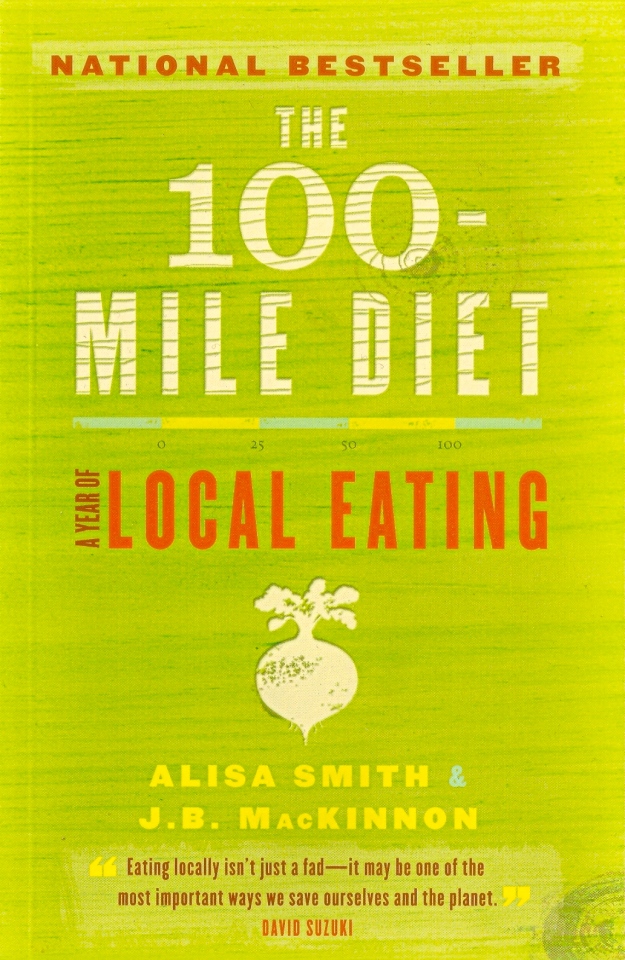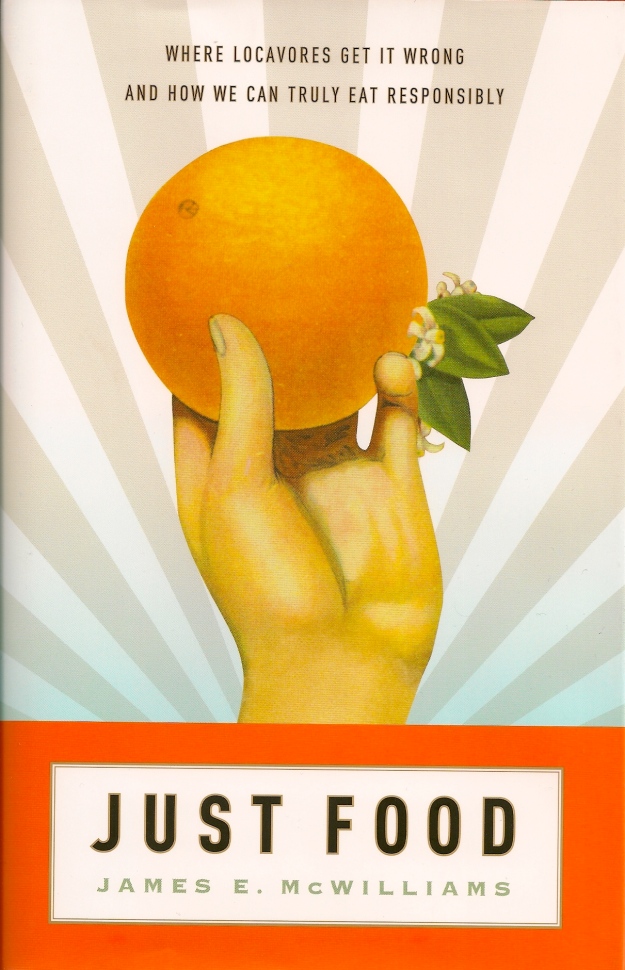
On the cover of one of the landmark books of the locovore movement, the 100 Mile Diet by Smith and MacKinnon, our favorite local environmentalist David Suzuki boldly proclaims:
“Eating locally isn’t just a fad – it may be one of the most important ways we save ourselves and the planet.”
What a lovely sentiment. I must admit that for me, the warm and fuzzies of the local food moment has been a huge draw.
Like most people I have felt completely overwhelmed by the doom and gloom messages about the peril our planet is currently facing. It seems like ever since the tipping point moment of Al Gore’s An Inconvenient Truth, we have all suddenly become consumed with concern for the environment. The slow food movement was alive and well long before good old Al got going, but it seems that was the moment that catapulted what was previously the stuff of scientific crack pots to the realm of accepted public opinion.
For me, the local food movement offered an opportunity to face the problem rather than bury my head in the sand. Rather than feeling overwhelmed, books like the one above offered individuals an opportunity to make concrete change through positive joyful action, one meal at a time. By eating locally we were saving the planet, stickin’ it to the man, big business and those awful agri-industry monsters. Easy peasy, right?
Maybe too easy.
 The stronger the local food movement grows, the more push-back there is from those who stand to loose. Or maybe they’re simply those who don’t like the idea of people thinking for themselves rather than swallowing the marketing pill du jour. (Ok I admit it, I’m a bit cynical, forgive me.)
The stronger the local food movement grows, the more push-back there is from those who stand to loose. Or maybe they’re simply those who don’t like the idea of people thinking for themselves rather than swallowing the marketing pill du jour. (Ok I admit it, I’m a bit cynical, forgive me.)
I’ve written recently about the Fraser Institute’s report that recommends we not farm in BC at all. And while I believe that a lot of the criticism of locovores is absolutely ridiculous, I am starting to see some that I can’t deny (although it pains me to say it) – make sense.
I’ve just started reading Just Food and although a lot of what he says I think is too cynical, even for me, he does have some good points.
For example, he points out that our insistence on focusing on food miles alone misses the mark in the same way focusing on “organic” alone does. The food miles say nothing about how a product is grown, how it got to market, how it was prepared – and it turns out that all of these things contribute to the totally energy usage (think carbon footprint) way more than the gas used to truck it from here to there. In fact – apparently if you live in Britain and are concerned about the environment, you’d be better off eating lamb shipped in from New Zealand than you would eating lamb from up the lane. Go figure.
A case in point: This past spring at the farmer’s market there was one booth that regularly had a line-up so long that it snaked through the market. At at time when my tomatoes were still knee-high to a grasshopper, this farmer had a booth full of heirloom tomatoes ripe and red as August. No one else seemed to be asking how the devil this guy managed to have tomatoes on offer a full 4 months before they should be in season, or considered how early he must have started them, kept someplace warm and bright through the dead of winter. But hey, they were local so they were fair game. It is this thinking, or lack thereof, that makes locovores vulnerable to criticism.
The argument is that although we embrace local eating as a political act and a means of democratising our food system, in reality, as it stands – it is largely blind to the issues that matter and has the potential to create a food system that is just as exclusive as the ones we say we’re trying to tear down.
McWilliams argues that in focusing on our own little neck of the woods, we are ignoring the elephant in the room: we will soon have 9-10 BILLION people on this planet without the faintest idea of how to feed them. Much of the world’s population lives where there is simply not enough water or viable soil to support a viable local food shed. So what of them? All the warm and fuzzies in the world isn’t going to fix that one.
Suddenly eating 100 mile heirloom tomatoes in May seems a bit – well, self-indulgent.
Depressing, isn’t it.
Cynical as I am, a pessimist I am not. Much of the criticism of eating locally grown food is based on assumptions that certainly don’t hold true for me, and so I would guess probably don’t hold true for a lot of other people.
First of all, I get that eating local won’t feed the world. I also understand that the local food movement both suffers from lack of economy of scale, but will not survive if scaled up. For this reason it’s reach will always be limited because, well, it’s local. Even for someone like me, shopping at the farmer’s market is not an option on a regular basis. It’s expensive. Often prohibitively so. Not to mention – not too many regular folk, myself included, are willing to completely forgo non-local food. (She says, while guzzling her second mocha of the morning.) I mean, come on! Life without chocolate or coffee or olive oil or French wine? No thanks!
However, rather than buy those freak of nature May tomatoes – I happily grew oh, I don’t know, 300 pounds? of my own lovelies – right on my doorstep. Organically, in season, on the cheap. No shipping no trucking no keeping cool no artificial ripening no storing. The vast majority of them lie in state in the cold room, patiently waiting their turn, not using any energy in the meantime. So there.
McWilliams points out that if we only farmed organically we would lose even more wild spaces to compromise for the loss of productivity. Considering lawns cover 30 million acres of the United States alone, and those lawns devour about 270 billion gallons of water per week, which as Heather Flores points out, is enough to water 81 MILLION acres of organic veg for an entire summer . . . There is a lot of room for organic veg “farming” that certainly won’t touch our wild spaces.
So far, the biggest miss of local food movement critics is thinking that we can solve the problems of modern agriculture as we know it with modern agriculture as we know it. That’s absurd. There are so many creative solutions, that may, in and of themselves be merely drops in the bucket, but on a global scale might actually make a difference.
Thankfully there is lots of room for compromise. It will not be one (slightly naive) movement that will save the world. It has to be a patchwork of solutions and as long as everyone finds at least one thing that works for them and their lifestyle, we’ll all be just that much better off.